- Home
- Fredric Brown
We All Killed Grandma Page 2
We All Killed Grandma Read online
Page 2
“And if Arch doesn’t kick in, you’ll probably do it out of your share.”
“Why not?” I said. “What’s a thousand out of nearly twenty? And she’s got it coming, working there that long. Or is it a change of character for me to feel like that? Was I a tightwad before?”
She looked away from my eyes on that. She said, “Damn you, Rod.” But not vindictively. “All right, you came here and I let you in; I suppose I might as well make a noise like a hostess. Will you have a drink?”
I nodded and started to say that, if she had it, whisky and water was what I liked. But I remembered in time not to say it.
She’d know that. She knew what things I liked and didn’t like better than I knew.
She walked toward one of the doors and it opened and gave me a quick flash of kitchen white before it swung shut after her.
She’d be busy for a few minutes and that gave me a chance to look around. I stood up and walked to the other door. It opened quietly and it led to the bedroom. I didn’t go in; I just stood in the doorway. There was a big double bed in the far corner and it was strange to look at that bed and realize that I didn’t recognize it. Like the living room the bedroom was well, but not expensively furnished. There was a door opening from it that no doubt led to the bathroom. I wondered if we’d had a tub or shower or both but it didn’t seem worth investigating.
I closed the door quietly. I was studying one of the prints, the Van Gogh, when Robin came back carrying two drinks. The one she handed me was whisky and water. I thanked her and sat down again and she sat down again, too. With a drink in her hand she looked more relaxed, less as though she expected me to stay only a moment.
She said, “What do you want to know, Rod?”
“About us,” I said. “About what happened to our marriage.”
“Why? It’s over now. It was over before you got amnesia. And in case you’ve forgotten—I mean, you wanted to forget it. So now that you have, why not let well enough alone?”
“I’ll remember sometime.”
“All right, you’ll remember sometime. And the farther in the future, the less it will matter.”
I took a sip of my drink while I hunted for words. I said, “I’ve got to know who and what I was. It’s a lost feeling not to remember. The two years I was married to you must have been an important part of my life. Ditto, the reason or reasons why you divorced me. Especially because it was so recent. Was it a month ago? I think that’s what Arch told me.”
“We separated a month ago. The actual divorce was Tuesday, only three days ago.”
I sat up straight. “You mean it was since—” And then I didn’t see how that mattered, so I thought a moment. I said, “Listen, Robin, how’s about briefing me from the start? Where did I meet you? How long did we know one another before we were married? That sort of thing. It’ll help orient me.”
“I was working for the Carver Advertising Agency when you started there as a copy writer three years ago. I was Mr. Carver’s private secretary. You asked me for a date the first week you worked there. We actually had our first date a month later. We went to see—”
“Wait,” I said. “Why the month interval? Was I a slow worker? Or were you playing hard to get—or what?”
She laughed a little, and suddenly a chunk of tension was gone. And I’d been right that one of the things for which her lips were made was laughter. It was a nice laugh, nice to watch and nice to hear.
She said, “Not exactly either of those things. It was—well, your first request was too casual, too disinterested, for me to—care to accept. A girl has pride, and, you see, I was second string. Has Arch mentioned Vangy Wayne?”
I shook my head.
“Evangeline Wayne, a little blonde who works for Carver too. She—well, I won’t go into detail about her or I might sound catty. I guess I couldn’t talk honestly about her and not sound catty. Anyway, you dated her first—I think about the second day you worked there. And you were seeing her fairly regularly by the time you first got around to asking me to go out with you—probably because Vangy had other plans for that evening.”
“But by a month later,” I said, “it was different. How? Had Vangy given me the brush-off or the other way around?”
“I never asked and I never cared. But by then you weren’t going with Vangy any more. And you were barely speaking to one another at the office. So that made it a little different. Besides, the second time you asked me to go out with you, you gave it a little build-up; you weren’t so casual about it. That helped.”
I tried to get some memory out of the name Vangy, but I couldn’t. I took a sip of my drink and said, “Go on, Robin.”
“Well—we kept seeing one another, more and more often. Six months after that we were engaged and a year after—I mean a year after we first met; it would have been about five months after our engagement—we were married.”
“Did you quit work then?”
“Not for the first year of our marriage. Neither of us had anything saved up and we decided—or I talked you into it—that we’d both work the first year so we could have a nice apartment and nice furniture and a nest egg in the bank before I quit work and—” She stopped suddenly and took a sip of her drink and I got the impression that she’d started to say something she didn’t want to finish and that the drink was just an excuse. I could have been wrong.
She looked at me again. “So—well, we got along all right that first year. I guess we were pretty happy. But then things started to go haywire between us, after I quit work.”
“Why?” I asked. “Wait, let me ask a specific question that’s a hell of a question to ask. Was I, as far as you know, unfaithful to you? Did I chase around with other women? For instance, Vangy? You said before that Vangy works at Carver, not that she worked there, so I deduce that she still does and that I must have been seeing her every day during that second year while things were coming unstuck. Did she have anything to do with what happened to us?”
She shook her head slowly. “No, Rod, not that I know of. Vangy or any other female. To the best of my knowledge you didn’t do any chasing. And—little gentleman that you are, you wouldn’t ask me this, so I’ll tell you anyway—I didn’t, either. Neither of us gave the other any particular cause for jealousy. We—we just gradually found ourselves to be less compatible than we’d thought at first. We finally decided to break it up.”
“Mutual decision?”
“Well, I guess it was my idea to begin with. But you agreed to it and you were co-operative about it. A month ago I left here and went back home, to Halchester, to get the divorce. With the agreement that you weren’t to contest, not even to appear.”
“Why Halchester?”
“My parents live there, and Dad’s a lawyer so he could handle it for me easily and quietly. It’s in the same state so there wasn’t any worry about residence requirements; I could just claim residence with my parents. And Dad’s a friend of the judge so he got it on the calendar quickly; it would have taken a lot longer here.”
“Everything went through all right? The divorce is final and all that?”
“Yes. Ten o’clock Tuesday morning.”
I thought, ten o’clock Tuesday morning. I’d been sleeping then; I hadn’t got to sleep for over an hour after Dr. Eggleston had dropped me off at my room a little after four and I’d slept till noon. I’d been divorced while I was asleep, and hadn’t known it was happening. From what little I’d learned about myself the night before, after midnight, I’d thought I was already divorced. And I hadn’t been. They tell you you had a wife named Robin and not that, technically, you still have one.
But what’s a few hours difference? Anyway, I hadn’t sat around worrying or regretting while the divorce was being handed down. That’s one way of handling a divorce: sleeping through it.
Robin was saying, “I guess you know the—But you wouldn’t, unless someone has told you what the terms were. No alimony, of course; I didn’t ask for any. On the property
settlement, you wanted me to take everything—not that there’s a lot of it—but I wouldn’t agree to that. I’m taking the furniture, except your books, of course; they’re already packed and in storage, with the two bookcases. On the bank account, we split even—five hundred and thirty-six dollars and some cents apiece.”
I said, “I found a bank book in my room, an account in my name at the Second National, balance a little over two hundred. As I understand it, I’ve been working regularly. Do you have any idea what I might have shot three hundred bucks for since we split the bank account?”
“Oh, that was the car. I forgot to mention it. You bought out my half for three hundred and fifty.”
“Car?” I said stupidly. “You mean I’ve got a car?”
“Yes. Do you mean—?”
“I mean,” I said. “Nobody mentioned it to me. What kind is it?”
“A forty-one Lincoln coupe. We bought it a year ago for five hundred; you said it was better than post-war cars and didn’t even have much mileage on it for a ten-year-old car. Then you spent some more money putting it in even better shape and when we were settling up you said it was worth at least seven hundred and offered me three-fifty for my share.”
“What did I do with it? Haven’t I still got it?”
“As far as I know. You’d better ask Arch.”
That I would do, definitely.
But for the moment I shoved the mystery of the car I did and didn’t have aside.
I said, “Robin, this isn’t my business, exactly, but I suppose that before I had some idea what your plans were. What are they? Are you going to keep on living here? And are you going back to work—and, if so, at the Carver Agency?”
The Carver Agency was still just a name to me; I hadn’t been there since what had happened, although a man who said his name was Gary Cabot Carver had called me on the phone and had told me to take my time about coming back to work, to take as much time as I wanted to rest up and orientate myself. But if I wasn’t coming back, because of the inheritance or for any other reason, he’d like to know it. I explained to him that the inheritance wasn’t anything to retire on and that I was glad to know I still had a job if I wanted it and that I’d be glad to come back in a week or so to see if I could still write advertising copy—and would understand his firing me if I couldn’t.
Robin was saying, “No, I’m not going to live here indefinitely. Just till our lease is up in another month and a half, and then I’ll find a smaller place. And yes, I’m going back to work; I have to eat. But not with Carver, Rod; that would be embarrassing for both of us.”
It wouldn’t have been embarrassing for me, but I could see how she would feel that way about it.
I looked at the glass in my hand; it was still half full. I asked, “Did I drink much, Robin?”
“No, not an awful lot. Frequently, but not too much at any one time. I’ve seen you a little fuzzy around the edges a few times, but never objectionably drunk.”
That made me feel a little better, to learn that I hadn’t been a lush. Certainly I must have been a little more than fuzzy around the edges Monday night—the police had tried a urinalysis test while questioning me and had found .3 per cent alcohol, which meant I’d been pretty drunk, and I was glad to learn such a condition wasn’t habitual or even frequent. And like as not I’d been doing some unusual drinking because the divorce was coming up the next day—although that didn’t particularly fit in with what Robin had just told me about my calm acceptance of being divorced and her statement that we’d agreed on it.
I didn’t want to press the point just then. And, although there were still a thousand questions I wanted to ask Robin, I couldn’t think of a single one.
I downed the rest of my drink and stood up. I said, “Thanks, Robin, thanks tremendously, for talking to me. I won’t ask you any more questions now. But—may I see you again?”
She stood too. She hesitated, considering, her head a little to one side.
I thought, suddenly and irrelevantly, how nice it would be to step up to her and put my arms around her and kiss her, as I must have done a thousand times.
Not that I was in love with her, understand. I didn’t even know her. But she looked very pretty and very kissable, standing there.
But it wouldn’t have been a good idea, just then. If ever.
I said, “I don’t mean I’m trying to start anything between us again. I suppose it’s almost impossible for you to realize that you’re a stranger to me, but you are. And if we didn’t get along—well, we didn’t and it would be foolish to start things over again. I presume that my character and personality aren’t changed and whatever I did to make you not love me would still operate. But listen, girl, there are still so many things you can tell me that will be important for me to know—unless I get my memory back again. So—well, unless you hate the sight of me and for all I know, you may—”
“It’s not that, Rod. We weren’t—aren’t enemies.”
“Then say yes. I promise, no passes. No ideas. Just impersonal, friendly talk. May I take you to dinner tomorrow night?”
“Rod, no, not that soon. I just got back this morning and I’ve got so many things to do. I haven’t even cleaned this apartment and I’ve got to start looking for a job and—everything.”
“How about Sunday night—day after tomorrow? You aren’t going to be looking for a job on Sunday night, or cleaning apartments either.”
“Well, all right, but—”
“I’ll pick you up here, at seven o’clock. And thanks again.”
I left, and the atmosphere wasn’t as cool as when I came. Almost, but not quite.
CHAPTER 2
OUTSIDE, it was warmer, too. Mid-afternoon, May, and the sun was finally succeeding in burning away the mists that had made the earlier part of the day cloudy.
But the mists in my mind were still there. Seeing Robin, seeing the apartment hadn’t given me a thing.
One item at a time, I told myself. Let’s find out about that car and get ourselves on wheels if there are still wheels to get onto. Why hadn’t Arch told me about it if I still had it? He’d been taking me some places in his Chevvie convertible and he knew I’d been taking taxis the rest of the time.
I walked down to the corner, a main intersection, and got myself a cab after a few minutes. I said, “Ten forty-four Chisholm Drive.” Grandma’s address. Arch was still living there; he’d lived there with Grandma all along. But then Arch wasn’t working, at least not remuneratively. He was a playwright; he’d sold a few one-act plays but nothing to the big time. Grandma had been supporting him.
A tall, narrow house, three story, red brick, ugly. Why would anyone have built a tall, narrow house on so wide a lot? There was thirty yards of space on one side of it, twenty on the other. Some trees, shrubs, flowerbeds, but no orderly landscaping, nothing fancy.
I went up the walk to the house and the door was open so I didn’t have to use my key. An elderly woman was working in the front hall. She said, “Hello, Mr. Britten.”
“Is Arch around, Mrs. Trent?” I asked.
“No, sir. He left an hour, maybe two hours ago. He said he’d be back by dinner time, though. Will you be eating here tonight with him?”
“No thanks. Uh—do you happen to know anything about my car?”
“Your car, Mr. Britten?”
“I just learned that I had—or have—a forty-one Lincoln coupe. Do you know anything about it?”
“Why, yes. I mean no. I mean, you did have a car; you used to come here in it when you came. But you didn’t keep it here. You always just parked it in the driveway whenever you came.”
“You don’t know where I did keep it?”
“Why, I guess where you live. I don’t know.”
“Okay,” I said. “Thanks, Mrs. Trent. I’ll phone Arch around dinner time. Unless you know where he is now—?”
“No, I don’t, sir.”
I said, “Please don’t call me ‘sir,’ Mrs. Trent. Or ‘Mr. Britten.�
� My name is Rod.”
She smiled a little. “All right, Rod. I—used to call you that; you told me to. But I didn’t know if you’d remember that, since you—I mean—”
“I’m the same guy, Mrs. Trent. I hope. Do you know if Mr. Henderson would be home now?”
Mr. Henderson—Vincent R.—lived next door. He’d been, so I was informed, a friend of the family and Grandma Tuttle’s only close friend outside the family. An attorney, he’d done some of her legal work for her, but mostly they’d played casino together, Grandma’s only recreation outside of making money. He was younger than she, but not too much—fifty-eight, I believe Arch had said, against her sixty-four—and a widower. They’d been close friends.
I hadn’t talked to him, except briefly at the funeral, but Arch had told me we knew and had liked one another fairly well, as well as two people thirty years apart in age are likely to know one another. Besides, what he had told the police had been one of several reasons why they hadn’t held me or seriously suspected me. I’d been wanting to talk to him since I’d learned that.
Mrs. Trent said, “I don’t know, Rod. Let’s see, this is Friday. He might be home; I don’t believe he goes to his office on Friday afternoons, mostly.”
I went next door and rang the bell. A woman who could have been Mrs. Trent’s sister—but wasn’t—answered the door and I asked her if Mr. Henderson was home. Before she could answer me, I saw him coming up behind her.
“Rod. Come in. I’ve been hoping you’d drop around.”
He was a little less than medium height, bald except for a fringe of gray hair. He didn’t look quite the fifty-eight years Arch had said he was. He had cheerful little eyes behind thickish glasses; eyes never really twinkle, but his came close to it. I liked him.
He led the way into a study with a big roll-top desk, a kind they haven’t manufactured for forty years or so, and this one looked older than that. Every pigeonhole in it was stuffed with papers. He sat down in an equally ancient swivel chair and waved me to a comfortable overstuffed one.

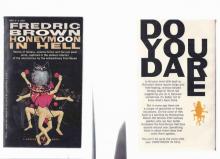 Hall of Mirrors
Hall of Mirrors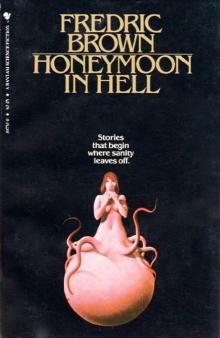 Honeymoon in Hell
Honeymoon in Hell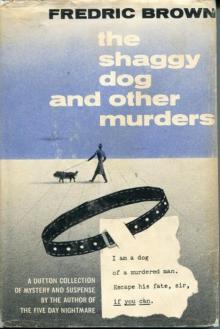 The Shaggy Dog and Other Murders
The Shaggy Dog and Other Murders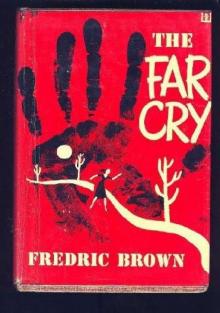 The Far Cry
The Far Cry Arena
Arena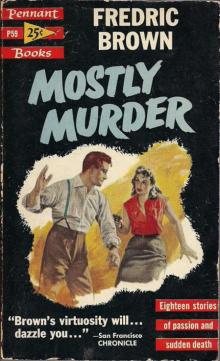 Mostly Murder
Mostly Murder The Geezenstacks
The Geezenstacks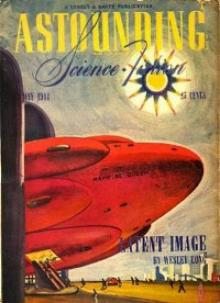 The Yehudi Principle
The Yehudi Principle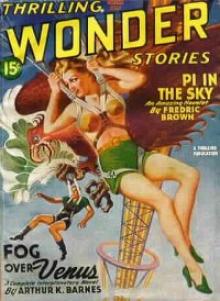 Pi in the Sky
Pi in the Sky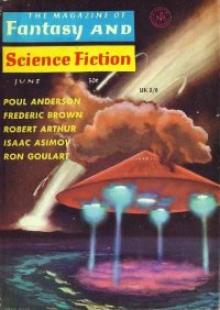 Eine Kleine Nachtmusik
Eine Kleine Nachtmusik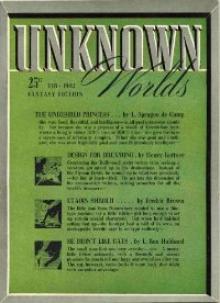 Etaoin Shrdlu
Etaoin Shrdlu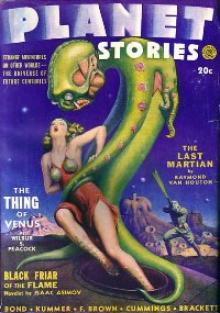 The Star Mouse
The Star Mouse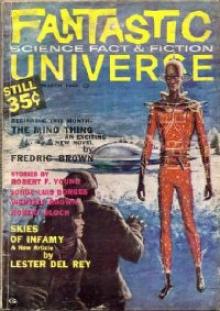 The Mind Thing
The Mind Thing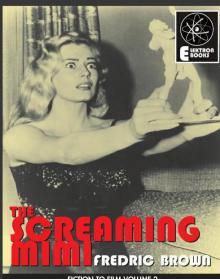 The Screaming Mimi
The Screaming Mimi The Fabulous Clipjoint
The Fabulous Clipjoint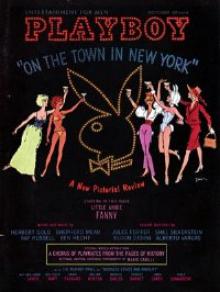 Puppet Show
Puppet Show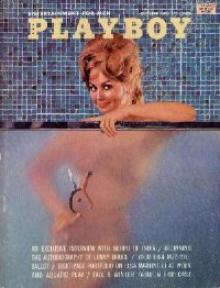 It Didn't Happen
It Didn't Happen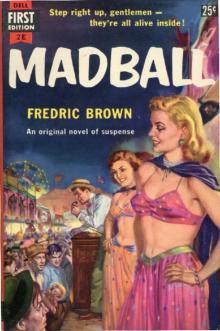 Madball
Madball Happy Ending
Happy Ending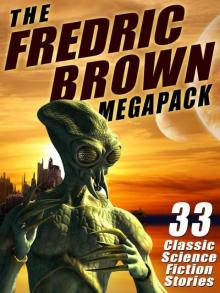 The Fredric Brown Megapack: 33 Classic Science Fiction Stories
The Fredric Brown Megapack: 33 Classic Science Fiction Stories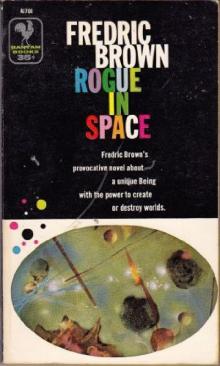 Rogue in Space
Rogue in Space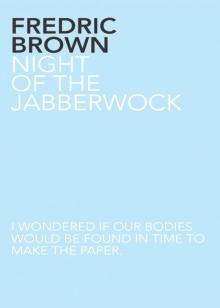 Night of the Jabberwock
Night of the Jabberwock The Dead Ringer
The Dead Ringer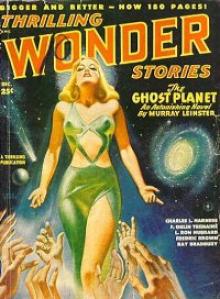 Knock
Knock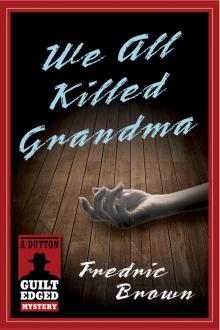 We All Killed Grandma
We All Killed Grandma Space On My Hands
Space On My Hands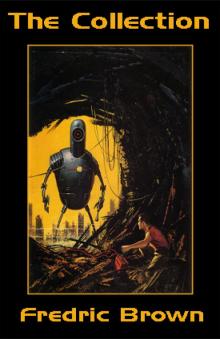 The Collection
The Collection The Second Fredric Brown Megapack: 27 Classic Science Fiction Stories
The Second Fredric Brown Megapack: 27 Classic Science Fiction Stories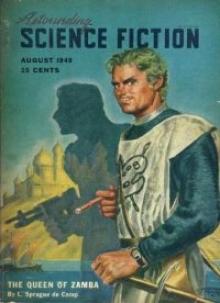 Letter to a Phoenix
Letter to a Phoenix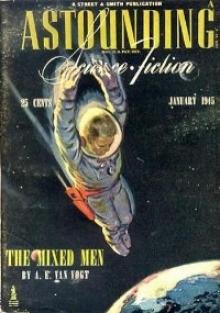 The Waveries
The Waveries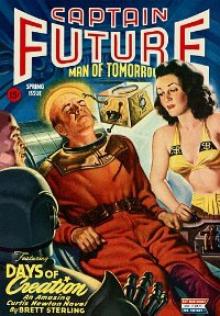 Nothing Sirius
Nothing Sirius The Deep End
The Deep End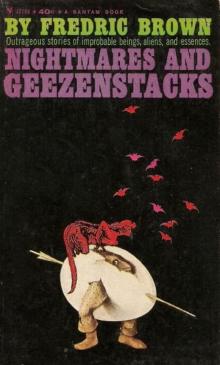 Nightmares & Geezenstacks
Nightmares & Geezenstacks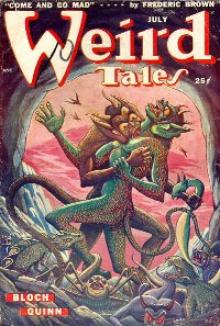 Come and Go Mad
Come and Go Mad Martians, Go Home
Martians, Go Home